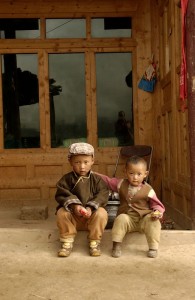He Said, She Said
08/05/11
With immigrant families, one hears all the time about children translating for their non-English-speaking parents or grandparents. In our bilingual, bicultural household this paradigm doesn’t apply cuz I talk English real okay and my mother doesn’t live in the USA (that rhyme could be in a Violent Femmes song).
But with two languages flying around all the time, and with three people (my wife and my two boys) developing their bilingual skills (my skills are on the decline on account of my tired, aging brain and having misplaced my Omega-3s), one should expect a certain amount of translation going on (i.e. me torturing my boys, drill sergeant style, when they use English words with me).
Recently, I was sitting at the dinning room table, being the engaged and emotionally available father that I am (while hypnotized by Twitter on my iPhone) as my wife was helping the boys wash their hands for dinner. The 0.3 % of my neurons not taken up by cleverness from the Twitterverse were being alerted of some sort of argument breaking out by the bathroom sink. My son Sam (age 2) was emphatically telling my wife, over and over, something she couldn’t understand because of his some time incomprehensible two-year-old enunciation. And the more perplexed she acted, the more frustrated he became until he was on the brink of tears (or potentially, whining, which can be more lethal). In walks my son Gabe (age 4) to assess the situation and very maturely fill his distracted father’s role:
– “Mamá, he is saying ‘poquito’ because you’re opening the faucet too much” explained Gabriel.
“Poquito” (“a little bit”) is one of the many words that Sam still says exclusively in Spanish. I’ve written before about how it seems like, for the first two years or so, the vocabulary of bilingual kids is influenced by the context in which certain words are learned. For Sam, the context for “poquito” (“a little”) and “mucho” (“a lot”) has been his drill sergeant father sternly teaching him the “just right” amount of water one needs to wash one’s hands. Yes, I have set up a “college/therapy savings account” for my boys.
Once again, I’m delighted by these signs of both languages taking strong hold in my children and I hope that as years go by, they won’t be people who speak Español only “un poquito.”



I love this in so many ways.
As for vocabulary being influenced by context for the first 2 years, I can tell you, it extends much farther. My boys are now 13 and 10 – they still, even when they’re engaged in a completely English conversation, never, ever say the word “butt” — it’s always “culito” – thanks to the fact that it is one of the very few words my husband used consistently when they were babies. LOL.
Other vocabulary words that have held tight after all these years – “pepito” for penis, and “pedito” for fart. Obviously my husband, Carlos, has them covered for Spanish potty words.